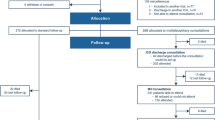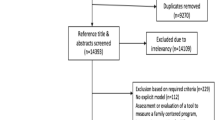Abstract
Context: Established in 1997, Summa Health System’s Medical Ethics Committee (EC) serves as an educational, supportive, and consultative resource to patients/families and providers, and serves to analyze, clarify, and ameliorate dilemmas in clinical care. In 2009 the EC conducted its 100th consult. In 2002 a Palliative Care Consult Service (PCCS) was established to provide supportive services for patients/families facing advanced illness; enhance clinical decision-making during crisis; and improve pain/symptom management. How these services affect one another has thus far been unclear. Objectives: This study describes EC consults: types, reasons, recommendations and utilization, and investigates the impact the PCCS may have on EC consult requests or recommendations. Methods: Retrospective reviews of 100 EC records explored trends and changes in types of consults, reasons for consults, and EC recommendations and utilization. Results: There were 50 EC consults each in the 6 years pre- and post-PCCS. Differences found include: (1) a decrease in number of reasons for consult requests (133–62); (2) changes in top two reasons for EC consult requests from ‘Family opposed to withdrawing life-sustaining treatment (LST)’ and ‘Patient capacity in question’ to ‘Futility’ and ‘Physician opposed to providing LST’; (3) changes in top two recommendations given by the EC from ‘Emotional Support for Patient/Family’ and ‘Initiate DNR Order’ to ‘Comfort Care’ and ‘Withdraw Treatment.’ Overall, 88% of recommendations were followed. Conclusion: PCCS availability and growth throughout the hospital may have influenced EC consult requests. EC consults regarding family opposition to withdrawing LST and EC recommendations for patient/family support declined.

Similar content being viewed by others
References
Brennan, T. (1988). Ethics committees and decisions to limit care. Journal of the American Medical Association, 260, 803–807.
Csikai, E. (1998). The status of hospital ethics committees in Pennsylvania. Cambridge Quarterly of Healthcare Ethics, 7, 104–107.
Emanuel, E., & Emanuel, L. (1992). Four models of the physician-patient relationship. Journal of the American Medical Association, 267(16), 2221–2226.
Fox, E., Myers, S., & Pearlman, R. A. (2007). Ethics consultation in United States hospitals: A national survey. The American Journal of Bioethics, 7, 13–25.
Gonsoulin, T. P., & Taube, J. M. (2002). Hospital ethics committees: Formation, function, and case consultation. Journal of the Louisiana State Medical Society, 154, 323–327.
LaPuma, J., Stocking, C. B., Silverstein, M. D., DiMartini, A., & Siegler, M. (1988). An ethics consultation service in a teaching hospital. Journal of the American Medical Association, 260, 808–811.
McGee, G., Spanogle, J., Caplan, A., Penny, D., & Asch, D. (2002). Successes and failures of hospital ethics committees: A national survey of ethics committee chairs. Cambridge Quarterly of Healthcare Ethics, 11, 87–93.
Radwany, S., Mason, H., Clarke, J. S., et al. (2009). Optimizing the success of a palliative care consult service: How to average over 110 consults per month. Journal of Pain and Symptom Management, 37, 873–883.
Romano, M. E., Wahlander, S. B., Lang, B. H., Li, G., & Prager, K. M. (2009). Mandatory ethics consultation policy. Mayo Clinic Proceedings, 84, 581–585.
Rosner, F. (1985). Hospital medical ethics committees: A review of their development. Journal of the American Medical Association, 253, 2693–2697.
Scheirton, L. S. (1992). Determinants of hospital ethics committee success. H E C Forum, 4, 342–359.
Schneider, P. A. D. (2000). A study of twelve hospital ethics committees in Eastern South Carolina. Journal of the South Carolina Medical Association, 96, 409–415.
Sexson, W. R., & Thigmen, J. (1996). Organization and function of a hospital ethics committee. Clinics in Perinatology, 23, 429–436.
Van der Heide, I. G. (1994). Hospital ethics committees in practice: The case review function of four HECs in Connecticut. H E C Forum, 6, 73–84.
Youngner, S. J., Jackson, D. L., Coulton, C., Juknialis, B. W., & Smith, E. M. (1983). A national survey of hospital ethics committees. Critical Care Medicine, 11, 902–905.
Acknowledgments
This study was partially funded by the Summa Foundation and the Department of Internal Medicine, Summa Health System.
Author information
Authors and Affiliations
Corresponding author
Rights and permissions
About this article
Cite this article
Moeller, J.R., Albanese, T.H., Garchar, K. et al. Functions and Outcomes of a Clinical Medical Ethics Committee: A Review of 100 Consults. HEC Forum 24, 99–114 (2012). https://doi.org/10.1007/s10730-011-9170-9
Published:
Issue Date:
DOI: https://doi.org/10.1007/s10730-011-9170-9




